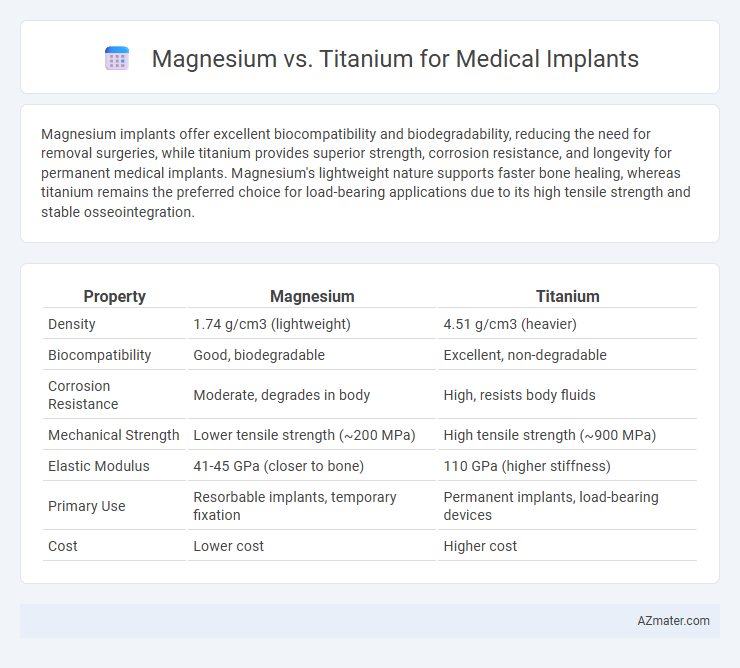Magnesium implants offer excellent biocompatibility and biodegradability, reducing the need for removal surgeries, while titanium provides superior strength, corrosion resistance, and longevity for permanent medical implants. Magnesium's lightweight nature supports faster bone healing, whereas titanium remains the preferred choice for load-bearing applications due to its high tensile strength and stable osseointegration.
Table of Comparison
| Property | Magnesium | Titanium |
|---|---|---|
| Density | 1.74 g/cm3 (lightweight) | 4.51 g/cm3 (heavier) |
| Biocompatibility | Good, biodegradable | Excellent, non-degradable |
| Corrosion Resistance | Moderate, degrades in body | High, resists body fluids |
| Mechanical Strength | Lower tensile strength (~200 MPa) | High tensile strength (~900 MPa) |
| Elastic Modulus | 41-45 GPa (closer to bone) | 110 GPa (higher stiffness) |
| Primary Use | Resorbable implants, temporary fixation | Permanent implants, load-bearing devices |
| Cost | Lower cost | Higher cost |
Introduction to Magnesium and Titanium in Medical Implants
Magnesium and titanium are widely used metals in medical implants due to their biocompatibility and mechanical properties. Magnesium offers the advantage of biodegradability, allowing implants to gradually dissolve in the body, reducing the need for secondary surgeries. Titanium is renowned for its strength, corrosion resistance, and long-term stability, making it ideal for permanent implants in orthopedic and dental applications.
Biocompatibility: Magnesium vs Titanium
Magnesium exhibits excellent biocompatibility due to its biodegradability and similarity to natural bone minerals, which promotes osseointegration and reduces inflammation. Titanium, widely used in medical implants, offers outstanding corrosion resistance and long-term stability, minimizing adverse tissue reactions and supporting sustained biocompatibility. Both metals provide superior compatibility with human tissue; however, magnesium's bioresorbable properties make it ideal for temporary implants, while titanium's inert nature suits permanent prosthetics.
Mechanical Properties Comparison
Magnesium exhibits a lower density (1.74 g/cm3) and Young's modulus (~45 GPa) closer to natural bone compared to titanium's higher density (4.5 g/cm3) and modulus (~110 GPa), reducing stress shielding in implants. Titanium's superior tensile strength (up to 900 MPa) exceeds magnesium's (~250 MPa), offering greater mechanical durability for load-bearing applications. Magnesium's biodegradability contrasts with titanium's inertness, influencing implant longevity and mechanical integrity over time.
Corrosion Resistance in Body Environments
Magnesium exhibits a faster corrosion rate in body environments, leading to quicker degradation which can be advantageous for temporary implants but problematic for long-term stability. Titanium offers superior corrosion resistance due to its stable oxide layer, ensuring durability and biocompatibility in various physiological conditions. The choice between magnesium and titanium for medical implants depends on the desired balance between biodegradability and long-term corrosion resistance.
Degradation and Bioabsorbability
Magnesium alloys exhibit controlled degradation rates and high bioabsorbability, making them ideal for temporary medical implants that gradually dissolve and promote natural tissue regeneration. In contrast, titanium implants offer superior mechanical strength and corrosion resistance but remain permanent due to their negligible degradation and lack of bioabsorbability. The biodegradable nature of magnesium reduces the need for secondary surgeries, while titanium's stability ensures long-term structural support in permanent implants.
Osseointegration and Bone Healing
Magnesium implants exhibit superior osseointegration due to their biodegradability and ability to stimulate new bone formation through the release of bioactive ions that enhance cellular activity. Titanium remains the gold standard for medical implants, offering exceptional mechanical strength and biocompatibility but with limited bioresorbability, requiring permanent placement. Studies demonstrate that magnesium's controlled degradation promotes accelerated bone healing while reducing inflammation compared to titanium, making it advantageous for temporary orthopedic applications.
Common Medical Applications
Magnesium and titanium are commonly used in medical implants, with magnesium favored for biodegradable implants such as bone screws and plates due to its excellent biocompatibility and ability to gradually dissolve in the body. Titanium is widely utilized in permanent implants like joint replacements, dental implants, and fracture fixation devices because of its superior strength, corrosion resistance, and long-term stability. Both metals play crucial roles in orthopedic, dental, and cardiovascular applications, with magnesium offering the advantage of reducing the need for secondary surgeries and titanium providing durable support for load-bearing implants.
Safety and Long-term Performance
Magnesium and titanium are prominent materials for medical implants, with magnesium offering excellent biocompatibility and biodegradability, reducing the need for secondary surgeries. Titanium exhibits superior corrosion resistance and mechanical strength, ensuring long-term structural stability in load-bearing applications. Safety concerns for magnesium include potential rapid degradation and hydrogen gas release, while titanium's inert nature minimizes adverse tissue reactions over extended periods.
Cost and Manufacturing Considerations
Magnesium implants offer cost advantages due to lower raw material expenses and simpler machining processes compared to titanium, which requires more energy-intensive and precise manufacturing techniques. Titanium's superior mechanical strength and corrosion resistance result in longer production times and higher fabrication costs, despite its widespread availability in medical-grade forms. Balancing initial cost with performance, magnesium provides a cost-effective option for biodegradable implants, whereas titanium remains preferred for durable, long-term applications.
Future Trends in Implant Materials
Magnesium and titanium represent two pivotal materials in the evolution of medical implants, each offering distinct advantages that drive future trends. Magnesium's bioresorbable properties promote natural bone healing and reduce the need for secondary surgeries, aligning with the growing demand for temporary implants. Titanium's superior strength, corrosion resistance, and biocompatibility continue to make it a cornerstone for permanent implants, with ongoing innovations targeting enhanced osseointegration and lightweight design for improved patient outcomes.

Infographic: Magnesium vs Titanium for Medical Implant
 azmater.com
azmater.com